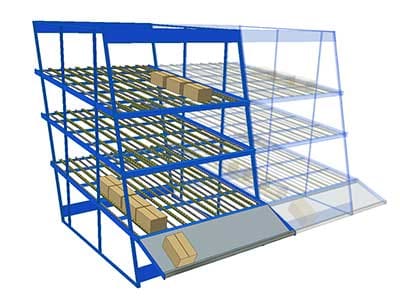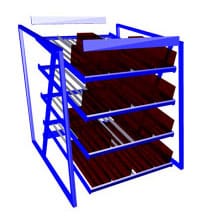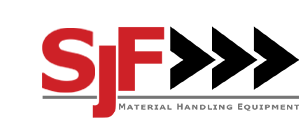What is Case & Carton Flow Rack? A Basic Buyer's Guide
Case & Carton Flow Racking Basics

If you are in any business where you do a lot of picking from inventory, Case & Carton Flow Rack is a product you should be aware of.
With carton flow, you stock from the back and pick from the front. A case flow rack or carton flow rack has several shelves, and each shelf generally has 4 or 6 lanes. Specific products are assigned to each lane. As items are picked, the next item slides down to take its place at the face of the racking. Everything works using rollers and gravity (nothing motorized here). With a carton flow system, costs are kept low and efficiency is high.
Static Rack vs. Dynamic Rack
In a traditional static racking system such as pallet rack or bulk shelving (shown at left in Figure 9), the stocking and picking operations are often performed at the same time. This often causes interference as well as a lot of time wasted in travel.
With a dynamic system such as gravity flow, carton flow or spantrack (shown at right in Figure 9), the stocking and picking operations are kept separate to keep interference to a minimum.
A carton flow rack system can also help keep inventory better organized and can help with inventory concerns as all products and quantities are immediately visible. This allows inventory control specialists to keep track of product counts, shortages and other inventory concerns.
Choosing Carton Flow
Do you need a starter unit, an add-on unit or individual components?
- A carton flow starter unit includes two uprights, four, five or six shelves, roller guides, roller tracks and sway braces. Shelf clips are also included.
- A carton flow add-on unit includes one upright instead of two. The add-on unit can be used with the starter unit or your existing flow rack.
- Separate carton flow components may be purchased to replace or add to the system you have.
Flow racks within pallet racking
Flow rack can be used in conjunction with pallet rack to maximize your storage space. The pallet rack can create storage above the flow rack system. To support the additional load 3”x3” posts replace the 1 ½” flow rack posts and heavy beams replace the sway braces. Using the Universal Hanger Clips in conjunction with carton flow shelves you can even turn your existing static pallet rack into a dynamic carton flow system.
Carton Flow Rack Components

Like pallet rack, carton flow rack is modular and consists of many individual components. Units can be strung together utilizing 'starter' and 'adder' sections to create entire rows of carton flow storage. There are also several distinct types of carton flow frames and shelves that can be utilized in a variety of situations (see figure 11).
The most common types of carton flow frames are square front and layback. Square front carton flow frames are useful for picking full cases. Applications include canned goods, liqour, parts, etc. Layback carton flow frames are useful when picking from open cases. Applications may include health & beauty products, books, or other situations where the cases are differently sized. Another advantage to layback frames is that it is easier for workers to access the middle and lower shelves. This is typically where you'd store your highest turnover merchandise, thus creating faster and more efficient picking.
There are also several different types of carton flow shelves that assist in different picking applications. Straight shelves are the
most common type of carton flow shelf, and are most commonly used when picking full cases. Knuckled shelves are the second most common carton flow shelf type and are useful for picking individual items from the cartons. Weld-in trays are similar to knuckled shelves but provide a larger access space from which to pick items. Finally, reverse knuckled shelves are useful for split case picking when the items are picked from the front of the cartons.
Roller track is at the heart of carton flow rack's operation. It is on these tracks that the actual product (in cartons) rolls forward toward the front of the rack. Typically, these rollers are used in pairs to form "lanes" in each carton flow shelf. These lanes keep similar products separated. Shelf guides work with the roller track to keep product separated. The guides are placed between lanes to keep products rolling in their specific lanes so they do not cross over into other lanes on the carton flow shelves. Carton flow clips hold the carton flow shelves to the frames. Some of these clips can also be used with regular pallet rack frames to allow you to create a mix of carton flow rack and pallet rack in the same vertical space.
Carton Flow Rack Components
Carton Flow Upright Frames
Frame sizes are 60", 66" or 96" wide and 60", 90" or 120" deep. All frames are 8' high (the 120" system is sold as a 2-piece unit). The frame is the basic supporting structure of the flow rack unit. Carton weight, size and throughput rates are variables to determine which model will deliver the desired results.
Frame Capacity
- 60" deep frames have a capacity of 6,000 lbs.
- 90" deep frames have a capacity of 8,000 lbs.
- 120" deep frames have a capacity of 12,000 lbs.
Frames have formed channels with a double row of slots to receive 3-prong clips for ½" vertical shelf adjust-ability. Columns are embossed with number scales for easy installation and adjust-ability.
Carton Flow Shelves
- The 60" deep unit requires a minimum of eight roller tracks and three guides per shelf. The capacity is 50 lbs. per lineal foot per lane with an evenly distributed load.*
- The 90" deep unit requires a minimum of ten roller tracks and four guides per shelf. The capacity is 50 lbs. per lineal foot per lane with an evenly distributed load.*
- The 120" deep unit requires a minimum of twelve roller tracks and five guides per shelf. The capacity is 50 lbs. per lineal foot per lane with an evenly distributed load.*
Carton Flow Shelves
To determine the number of shelves required:
Number of Shelves = Available Height/Carton Height + 6.25"
(divide your available height by your carton height and add 6 ¼")
- Each lane in a shelf requires 2 roller tracks and 1 guide.
- Standard straight shelves have a 5 degree tilt. If you need knuckle or tilt tray shelves please call SJF at (800) 598-5532.
- The space between the top of a carton and the shelf above it should be large enough to allow each product to be removed freely.
- Shelf capacities are between 750-3,000 lbs.*
*Typical systems are designed for 25-30 lbs. per square foot, however these capacity ratings are ultimately dependent on the packages stored on the shelves. All packages must have evenly distributed weight so as not to create a point load situation on the roller tracks. If you have any questions about carton flow rack capacities, please call an SJF representative to discuss it.
Sway Braces
The sway brace comes in two widths: 4" and 7". Sway braces are designed to make the frames stable. Four-inch sway braces are used on the top rear and bottom front of all units. Seven-inch sway braces are used on the top front of all units. All units are braced at the bottom rear and the 120" unit is braced at the top center.





